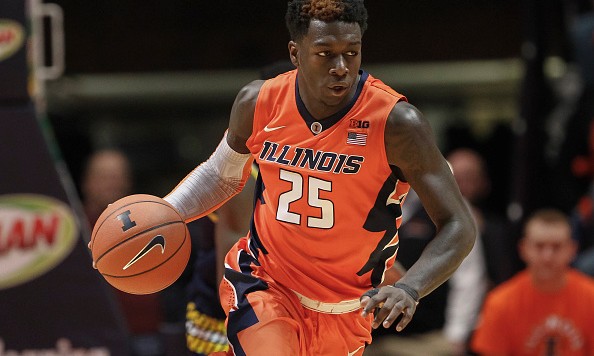If a 10-year-old girl teases her 5-year-old brother, he might counter with physical contact, resulting in a soft, harmless slap. Following a stern rebuke from his mother or father, little Timmy starts to cry. The goal of his parents then shifts towards putting a smile back on their son’s face, as if the incident never occurred.
Why should the NCAA provide a similar cushion for 20-year-old Kendrick Nunn, who transferred from University of Illinois Champaign-Urbana to Oakland University after pleading guilty to a misdemeanor battery charge?
In mid-March, Nunn — accused of striking a woman in the head, shoving her to the floor, and dumping water on her amidst an argument — was charged with two counts of misdemeanor domestic battery. In May, he pleaded guilty to one count of misdemeanor domestic battery, which will be expunged from his record if he completes 100 hours of community service, a 26-week partner abuse prevention program, and composes a letter of apology to the victim, under 18 months of court supervision.
Less than a week later, Illinois’ athletic department dismissed Nunn from its basketball team.
Illini forward Leron Black and guard Jaylon Tate, two of his ex-teammates, both ran into trouble with the law, too, uncovering a lack of accountability within the program. On top of that, succeeding an arrest in France, former Illinois big man Darius Paul was booted off the roster prior to last season. Still, these instances shouldn’t relieve Nunn of his guilty plea.
In the 2015-16 campaign, the 6-foot-3 guard averaged 15.5 points, shooting 39.1 percent from the field, and five rebounds per game. Thus, his talent isn’t the problematic aspect.
Although the Champaign County Courthouse’s verdict altered his daily lifestyle for the foreseeable future, through switching schools, the then-junior possessed an opportunity to continue to play at the collegiate level.
For this loathsome culture to sustain a considerable modification, the NCAA must determine a set of ramifications for the offender, whether that’s a suspension worth half of the season or beyond. Until those regulations materialize, universities’ rape, assault, and battery cases will carry on relentlessly like an indomitable parasite, along with the committees from Division I, II, and III exhibiting their lust for an extra buck over students’ safety.
On April 12, the NCAA agreed to an eight-year extension through 2032, amounting to $8.8 billion, with CBS and Turner for the broadcasting rights to March Madness. Hence, unlike a mother raising her children under the viaducts, money isn’t a colossal issue.
The NCAA would’ve lost a chunk of change, though, if Baylor — which covered up its student athletes’ connections to eight separate sexual assault cases since 2009 — was smitten with the death penalty, causing the football program to evaporate for at least one season. However, were just one player to ride the bench for a select amount of games, the NCAA’s wallet should retain its brawny frame.
Prior to the start of the current MLB season, Yankees’ closer Aroldis Chapman was suspended for 30 games under the league’s new domestic violence policy. Jose Reyes, who recently returned to the Mets, collected a 52-game ban, following a domestic violence arrest in October. These rulings certainly served as a hefty warning to players around the league and could also represent a quintessential set of guidelines for the NCAA to implement.
Due to the collegiate transfer rules, Nunn must sit out next season but is eligible to suit up for the 2017-18 campaign. Another postponement of his first game in a Golden Grizzlies’ uniform would likely cause displeasure, but if the NCAA took a step back from the hardwood, it’d reveal extreme progress.
On the one hand, after about a month and a half, NFL commissioner Roger Goodell changed his mind on former Ravens’ running back Ray Rice’s domestic violence case, jumping from a two-game suspension to an indefinite one, due to the release of a video showing a punch to his then fiancee. Nevertheless, the NCAA would be heavily scrutinized for following suit on Nunn.
Yet, if the NCAA continues to act complacent, similar cases will persistently pop up. The individual committees need to display the urgency to make an example of one student athlete, so potential offenders, not their sought-after victims, taste fear.

